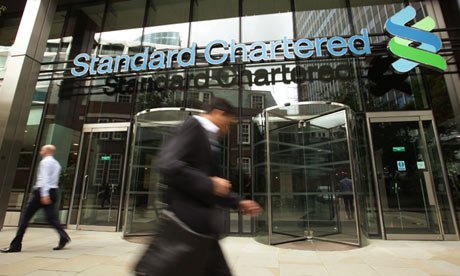
British bank Standard Chartered has agreed a $340 million settlement with New York regulators that accused it of hiding $250 billion of transactions with Iran.
The hearing that had been scheduled for Wednesday has now been adjourned.
Standard Chartered’s chief executive Peter Sands has been in New York negotiating with the regulators.
It had admitted that some of its transactions did break US sanctions, but said that the amount totaled just $14 million.
“The New York State Department of Financial Services (DFS) and Standard Chartered Bank have reached an agreement to settle the matter raised in the DFS order dated August 6, 2012,” a statement from the regulator’s superintendent said.
“The parties have agreed that the conduct at issue involved transactions of at least $250 billion.”

A short statement from Standard Chartered simply confirmed a settlement of $340 million had been reached.
“A formal agreement containing the detailed terms of the settlement is expected to be concluded shortly,” it added.
The bank also said it continued to “engage constructively” with other US authorities.
According to the terms of the settlement, Standard Chartered will pay a “civil penalty” of $340 million to the DFS.
It will also install a monitor for at least two years who will evaluate money-laundering controls at the bank’s New York branch and report directly to the regulator.
“In addition, DFS examiners shall be placed on site at the bank,” the statement said.
Finally, the settlement provided for permanent staff at the bank’s New York office to audit any money-laundering controls.
The $340 million was a “hefty penalty, but nothing like as hefty as it could have been” if the two parties had not negotiated a settlement. The DFS had, for example, talked of revoking Standard Chartered’s New York banking licence.
Last week, New York’s DFS alleged that the US unit of the bank had illegally hidden 60,000 transactions with Iran worth $250 billion over nearly a decade.
It accused the London-based bank of being a “rogue institution” for breaking US sanctions against Iran.
Peter Sands said at the time that he was “completely surprised” by the ferocity of the DFS’s attack, which he described as “disproportionate”.
He did, however, admit that 300 transactions did break US sanctions.
“This was clearly wrong and we are sorry that they happened,” Peter Sands said.